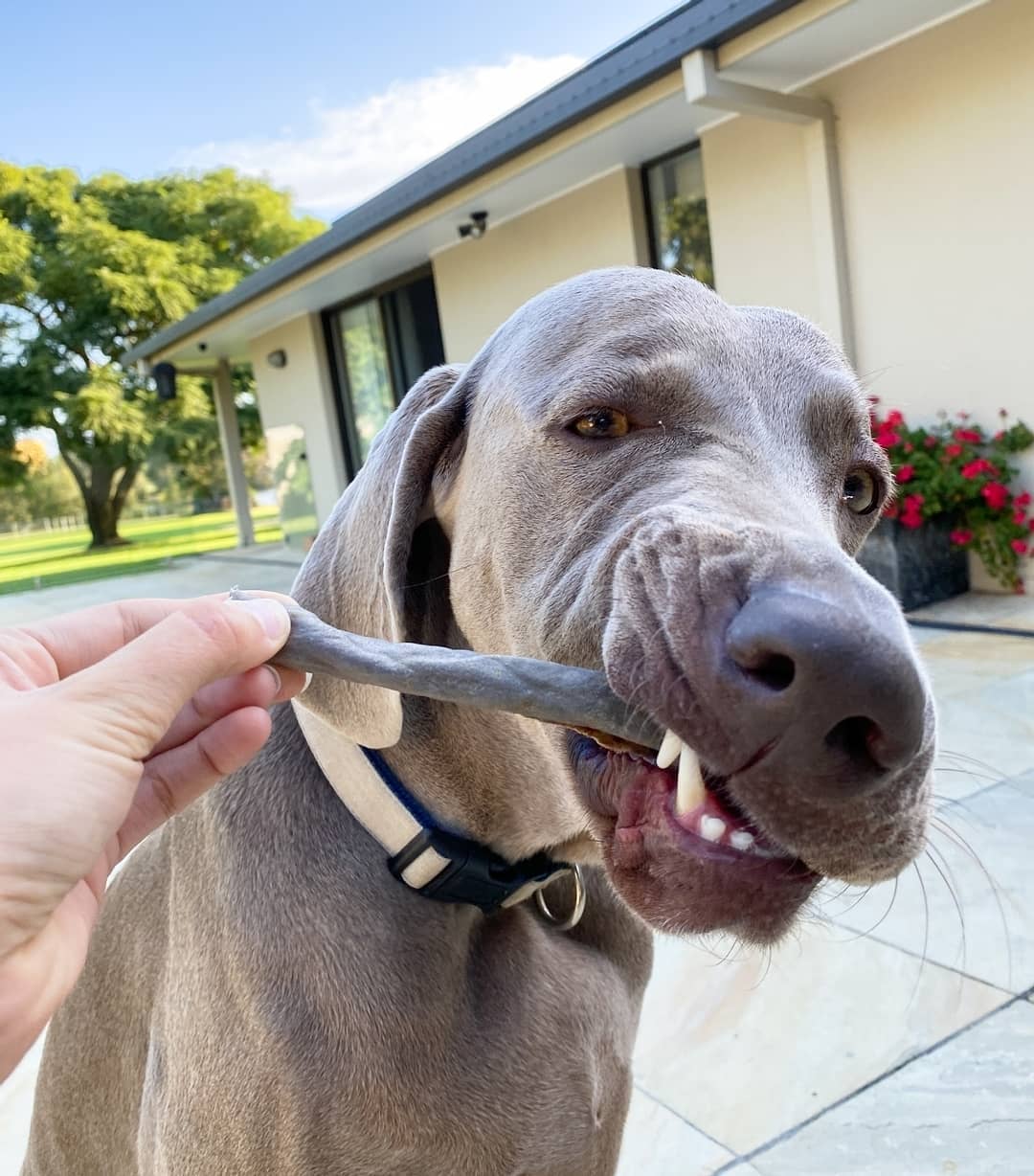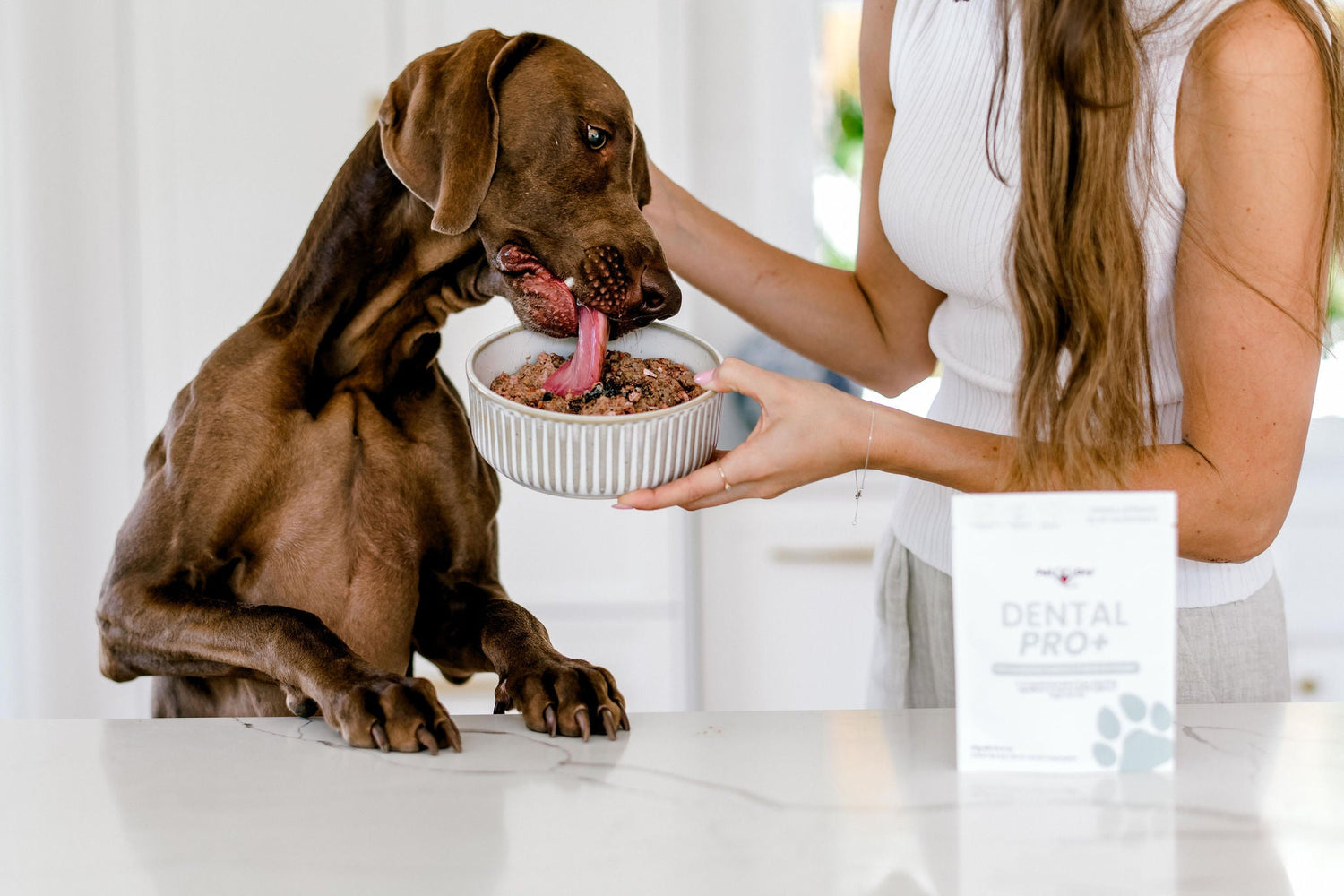A dog's dental health is more than just fresh breath—neglecting it can lead to chronic pain, tooth loss, and even systemic infections. Yet, many dental issues go unnoticed until they become serious. One day your dog seems fine, the next they’re struggling to eat, pawing at their mouth, or showing signs of infection. Fortunately, dog dental disease is preventable with the right approach to diet, daily care, and oral health support.
Did you know over 80% of dogs over the age of three show signs of dental disease?
(Source: American Veterinary Dental College)
What is Periodontal Disease?
The most common dental issue in dogs is periodontal disease, an inflammatory condition caused by plaque and tartar build-up. Plaque is a sticky biofilm filled with bacteria that forms after eating. If not removed, it hardens into tartar, irritating the gums and leading to gingivitis and bone loss. A dog’s alkaline mouth creates the perfect environment for this biofilm to thrive. Over time, the immune system responds with inflammation, which can erode gum tissue and the bone that supports the teeth. 📖 A 2020 study published in Frontiers in Veterinary Science links chronic oral inflammation in dogs to systemic health issues like heart and kidney disease.
Symptoms of Dental Disease in Dogs
Early signs can be subtle, but as the disease progresses, symptoms become more obvious:
- Persistent bad breath
- Bleeding, red or receding gums
- Loose or missing teeth
- Difficulty chewing or favouring one side
- Excessive drooling or bloody saliva
- Head shyness or pawing at the mouth
- Weight loss and reduced appetite
- Nasal discharge (advanced cases)
If you notice any of the above, book a dental check-up with your vet.
4 Ways to Improve Your Dog’s Dental Health Naturally
1. Support Their Teeth Through Diet
What your dog eats affects their teeth more than you might think. Processed kibble can stick to teeth and create a breeding ground for plaque. Instead, offer wholefoods or fresh options with a natural crunch, like carrots or celery. Certain natural ingredients have been studied for their dental benefits:
-
Ascophyllum nodosum (brown seaweed): Helps reduce plaque via saliva enzymes
(Study: BioMed Central Vet Research, 2016) - Pomegranate extract: Disrupts bacterial biofilm and reduces oral bacteria
- Zinc and probiotics: Support a balanced oral microbiome and reduce inflammation
2. Add a Targeted Dental Supplement
If brushing is a struggle, consider adding a supplement like Dental Pro+ to your dog's dental health routine. Dental Pro+ is a natural, vet-developed powder that:
- Softens plaque and tartar
- Targets bad breath from the gut (not just the mouth)
- Supports gum and tooth health with functional wholefood ingredients
Its blend of biofilm-disrupting herbs, minerals, and marine extracts works systemically—through the saliva and digestive system—for 360° dental support.
💬 Many pet parents using Dental Pro+ for their dog's dental health, report improvements in breath within 2–3 weeks and softer tartar over time!
3. Brush Their Teeth (If your pet allows)
While brushing isn’t always easy, even a few times per week can make a difference. Use a dog-specific toothbrush and toothpaste—never human toothpaste. Start slow and make it a positive bonding experience.
4. Use Smart Alternatives
If brushing isn’t possible, try combining different tools:
- Dental toys that can help mechanically reduce plaque
- Coconut oil (antibacterial properties)
- Healthy treats like frozen carrots or celery
- Veterinary dental cleanings when recommended
- Dog dental supplement like Dental Pro+
Talk to your vet about which combination works best for your dog’s age and dental status.
Final Thoughts on Dog Dental Care
Dog dental care doesn’t need to be overwhelming. With a combination of wholefood nutrition, natural supplements like Dental Pro+, and daily hygiene tools, you can keep your dog’s mouth healthy, fresh, and pain-free—without relying on harsh chemicals or expensive vet bills.
After all, prevention is always easier (and cheaper) than treatment!






